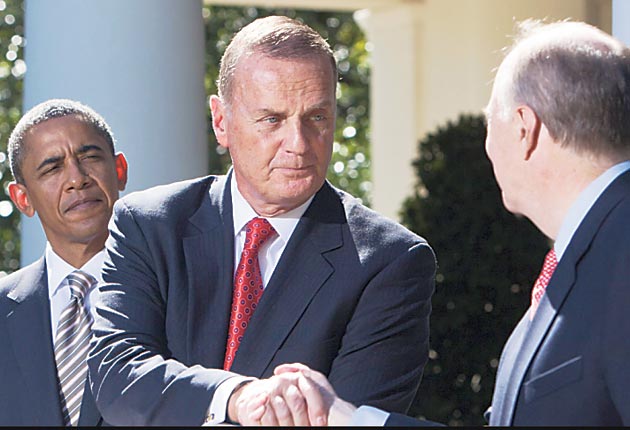Obama loses the man McChrystal called a clown

President Barack Obama performed one more awkward hello-goodbye ritual at the White House last night when he confirmed that General James Jones, who had been his National Security Advisor since the start of his tenure, was clearing his desk.
It comes a week after Mr Obama lost Chief of Staff Rahm Emanuel and gives new momentum to an exodus of aides that, while not unusual half-way through a president's term, is coinciding with a perilous time, three weeks from the mid-term congressional elections. Others who have left include the budget director, Peter Orszag, and the chairwoman of the Council of Economic Advisors, Christina Romber.
Mr Obama said he was "extraordinarily thankful" that Gen Jones, after being his top policy adviser during his campaign to be president, decided to take the White House post. "The American people owe Jim an unbelievable debt of gratitude," he said.
The President, who called him a "steady voice", said that the general had always made clear he would serve in Washington for a two-year period only. Yet some had painted him as a weak Security Advisor. And Obama's War, the latest book by the investigative journalist Bob Woodward, included passages that were not kind either to Gen Jones or to his deputy, Tom Donilon, who now replaces him as chief foreign policy adviser to the President.
In Woodward's book Gen Jones is cited complaining about Mr Emanuel and other members of Mr Obama's inner circle, calling them the "water bugs", the "politburo" and the "Mafia". He allegedly threatened to walk out once when he felt he wasn't getting proper access to the Oval Office.
Although the reviews of Mr Donilon are usually flattering – he is known for his ability to cast foreign policy decisions in a political light and to mediate between arguing parties – there is a moment in Woodward's book where Robert Gates, the Defence Secretary, suggests Mr Donilon would be a "disaster" as National Security Advisor. Yesterday, he was obliged to eat his words.
"I have thoroughly enjoyed working with General Jones," he said, "and I have had a very productive and very good working relationship with Tom Donilon, contrary to what you may have read. And I look forward to continuing to work with him."
Gen Jones came into the White House as a four-star Marine General with a stellar military record that included stints as Supreme Allied Commander, Europe, and Commander of the US European Command. His contacts with foreign leaders and military chiefs helped seal important foreign policy goals, including calming relations with Russia and a new arms treaty.
But he failed to persuade members of Congress to speed up the closure of Guantanamo Bay and apparently lost the respect of General David McChrystal, who was alleged in a Rolling Stone interview (which cost him his job) to have called Gen Jones "a clown".
Challenges facing Mr Donilon in the coming weeks include another review of policy in Afghanistan, which is unlikely to be positive. It was largely descriptions of in-fighting and squabbling at the time of the last review, a year ago, that fed the pages of Woodward's book.
The Obama musical chairs are not over yet. Larry Summers, his top economic advisor, will return to Harvard at the end of the year. David Axelrod is expected to leave early next year to work on Mr Obama's re-election campaign, and Robert Gibbs, the press spokesman, could soon be moving to a different job inside the White House.
The Successor: Tom Donilon
The Bob Woodward book may have helped push General Jones through the exits but apparently Tom Donilon has come to no harm despite a passage which has Robert Gates, the US Secretary of Defense, speculating that he would be a "disaster" if he ever became national security advisor.
Donilon now has to work with Mr Gates as well as with the Secretary of State, Hillary Clinton. Plus he has to negotiate all the other personnel moves going on inside the White House. His reputation is as a problem-solver and patient mediator.
And while Donilon kept a low profile as deputy advisor, he has plenty of experience – he served in the Carter administration and under Bill Clinton was chief of staff to secretary of state Warren Christopher. His biggest strength, supporters say, is his ability to counsel the President on the connections between foreign policy and politics. He helped push him towards the troop withdrawals in Iraq.
His appointment will surprise no one (save perhaps Mr Gates). Half of those who have served as deputy since the days of JFK, including Brent Scowcroft, Robert McFarlane and Colin Powell, have ended up as national security advisor.
Join our commenting forum
Join thought-provoking conversations, follow other Independent readers and see their replies
Comments